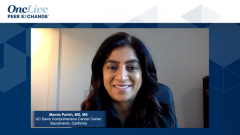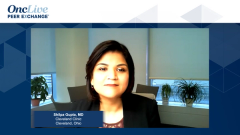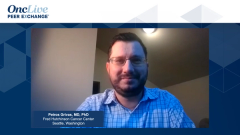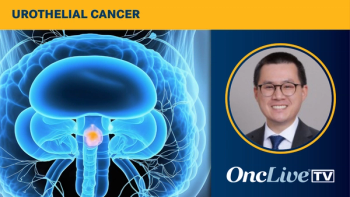
Metastatic Urothelial Carcinoma: Number of Frontline Chemotherapy Cycles
A brief review of the appropriate number of chemotherapy cycles to utilize in the setting of metastatic urothelial carcinoma.
Episodes in this series

Transcript:
Shilpa Gupta, MD: Now we’ll switch gears toa question I’ll ask Mamta Parikh, MD, MS. Mamta, in the frontline setting, the maintenance avelumab study, JAVELIN Bladder 100 [NCT02603432], uses 4 to 6 cycles of platinum therapies. What is your practice? Are you comfortable switching to maintenance after 4 cycles, or do you still go all the way to 6 cycles? I know there’s the DISCUS trial also looking at whether even 4 cycles is too much. They’re comparing 3 cycles vs. 4 cycles. What are your insights on that?
Mamta Parikh, MD, MS: I think it’s great that we’re looking at trials that are evaluating this further. Right now, my approach is to treat patients with 4 cycles of therapy, and then I assess at that point how they’re doing. If they’re having a response to therapy and they’re feeling well, I do discuss continuing for 2 more cycles. If they’ve had a lot of adverse effects from the platinum-based therapy, then I feel very comfortable with switching to avelumab at that point. We have the MAIN-CAV study [NCT05092958] open at our institution [UC Davis Comprehensive Cancer Center in Sacramento, California], which I think is going to be a really important study looking at whether there’s any benefit to the addition of cabozantinib on top of avelumab vs avelumab alone you’re leading those efforts. We’ll see what that shows, but I do right now, after 4 cycles, think about switching.
Shilpa Gupta, MD: Thank you. Petros Grivas, MD, PhD, is that in your practice too?
Petros Grivas, MD, PhD: It’s a great discussion. I want to echo what Andrea B. Apolo, MD and Mamta said. Shilpa, thanks for leading the effort to define the platinum-ineligible population. The distinction between cisplatin and platinum is that platinum includes carboplatin, so it’s important to define these criteria. You had a poster at the ASCO [American Society of Clinical Oncology] 2022 Annual Meeting, and I know you’re working on the manuscript, so it’s great to see this effort. I would say that in terms of the number of cycles, this is an individualized decision in clinical practice. As Andrea and Mamta said, we started with induction-based chemotherapy in fit patients. Personally, I reserve pembrolizumab alone, or, of course, clinical trials are across the board in all settings, but pembrolizumab alone is still approved in platinum-ineligible patients. I think these consensus criteria can help us define that population.
Most patients in my practice, about 80% or 90%, get platinum-based chemotherapy induction and ideally cisplatin. If they’re not fit for cisplatin, I give carboplatin. I do 3 cycles first, and then I restage the patient with CAT scans and then I see what the response is that I’m getting, what are the adverse effects, and the tolerability. Based on this benefit-risk ratio, I make individualized decisions about the number of cycles. If someone has a great response tolerating chemotherapy well, I try to go up to 6 cycles. If someone is struggling with toxicity issues despite those reductions and stable disease only, I may stop at 4 cycles. From the JAVELIN Bladder 100 trial, we saw that the benefit of avelumab maintenance seems to be consistent in patients regardless of if they got 4 cycles or 6 cycles. So, it’s an individualized decision with the patient based on response and toxicity.
Transcript edited for clarity.









































